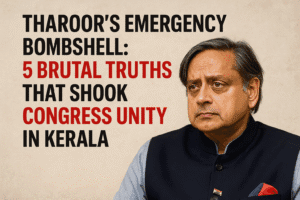Tharoor’s Emergency Bombshell: 5 Brutal Truths That Shook Congress Unity in Kerala
Congress MP Shashi Tharoor ignited controversy by explicitly blaming Indira and Sanjay Gandhi for severe human rights abuses during the 1975-77 Emergency, detailing forced sterilizations and killings. His article, amplified in Kerala media, forced the state Congress into an awkward position. Leader of Opposition V.D. Satheesan visibly sidestepped judgment, privately acknowledging an opinion but publicly deferring to the national leadership, highlighting the party’s fear of criticizing a senior CWC member.
Tharoor compounded tensions by promoting a survey projecting him as Kerala’s top Chief Ministerial candidate, overshadowing rivals and clashing with ongoing internal factionalism. This move, seen as self-promotion during delicate pre-election preparations for 2025/2026 polls, exposed deep rifts between Tharoor’s intellectual independence and the party’s demand for disciplined unity. The episode underscores the Congress’s struggle to reconcile its democratic image with its troubled historical legacy while managing ambitious leaders and internal rivalries.
Ultimately, Tharoor’s historical reckoning became a stark mirror reflecting the party’s contemporary vulnerabilities and leadership dilemmas in Kerala.

Tharoor’s Emergency Bombshell: 5 Brutal Truths That Shook Congress Unity in Kerala
The tranquil political waters of Kerala were roiled this week as Congress MP Shashi Tharoor’s unflinching critique of the 1975-77 Emergency period forced his own party into an uncomfortable defensive stance, revealing deep-seated tensions and strategic anxieties ahead of crucial state elections.
The Spark: Confronting the “Unspeakable Cruelty”
Tharoor, a prominent intellectual voice within the Congress and member of its highest decision-making body, the Congress Working Committee (CWC), penned a stark article recently published internationally and subsequently amplified by Malayalam daily Deepika. Moving beyond vague historical references, Tharoor explicitly attributed the “litany of human rights abuses, including torture in detention and extra-judicial killings” during the Emergency to the actions of then-Prime Minister Indira Gandhi and her son Sanjay Gandhi. He detailed the “unspeakable cruelty” of forced sterilizations and slum demolitions in Delhi, confronting a chapter many within the party prefer left in the past.
Kerala Congress: A Masterclass in Sidestepping
The reaction from the Kerala Congress leadership was a study in cautious evasion. Leader of the Opposition V.D. Satheesan, facing direct questions, offered a telling response: “I read Mr. Tharoor’s article and I have an opinion about it, which I reserve for myself.” He swiftly deferred any potential disciplinary action to the All India Congress Committee (AICC), emphasizing that “no Congress leader in Kerala will hazard an adverse comment” about a CWC member. This careful neutrality masks a palpable discomfort – acknowledging Tharoor’s points risks alienating loyalists who revere the Gandhi legacy, while condemning him silences a powerful voice and validates critics.
Adding Fuel: The “Chief Ministerial” Survey
Tharoor further complicated matters by sharing a survey from a Mumbai-based organization projecting him as Kerala’s most-preferred Chief Ministerial candidate, significantly ahead of incumbent Pinarayi Vijayan (CPI(M)), former Health Minister K.K. Shailaja, and crucially, other Congress contenders. Satheesan dismissed it as one of “scores of such surveys every day,” but the timing was deeply problematic for the state unit.
This move landed amidst existing turmoil:
- The “Captain” Controversy: Recent praise for Satheesan’s role in the Nilambur bypoll win sparked friction with senior leader Ramesh Chennithala, highlighting internal rivalries.
- Perceived Strains with High Command: Tharoor’s past deviations from the AICC line – including nuanced comments on the BJP and perceived praise for aspects of the CPI(M) state government – have fueled speculation about his relationship with the party leadership.
- Election Calculus: With local body polls in 2025 and the crucial Assembly elections in 2026 looming, the Congress desperately needs unity. Tharoor’s actions, seen by some as self-promotion, risk fracturing the facade and distracting from the anti-incumbency focus against the CPI(M).
The Core Tensions: History, Ambition, and Party Discipline
This episode isn’t merely about one article or survey; it exposes fundamental fault lines within the Congress in Kerala:
- Reckoning with History vs. Loyalty: Can the Congress, especially in a state where it positions itself as a democratic bulwark, genuinely confront the darkest chapters of its own past leadership? Tharoor’s candor forces an uncomfortable introspection many leaders seem unwilling to engage in publicly.
- The Intellectual Maverick vs. Party Discipline: Tharoor’s value lies partly in his independent, articulate voice. However, this independence often clashes with the party’s need for a unified message, especially on sensitive historical issues or during election seasons. Where is the line between healthy debate and disruptive dissidence?
- Leadership Ambitions and Factionalism: The CM survey sharing, following closely on the heels of the Nilambur “captain” dispute, underscores persistent jockeying for position within the Kerala Congress. Tharoor’s national stature and popularity make him a unique, but potentially destabilizing, force within the state hierarchy.
- Electoral Vulnerability: The leadership’s primary fear is that internal squabbles and controversies, especially those involving a high-profile figure like Tharoor, will derail their efforts to capitalize on anti-incumbency against the CPI(M) and present a cohesive alternative.
The Road Ahead: Navigating the Minefield
The Kerala Congress finds itself navigating a minefield. Silencing Tharoor risks backlash and accusations of stifling debate, particularly among younger voters and intellectuals who resonate with his forthrightness. Embracing his critique of the Emergency fundamentally challenges a core part of the party’s legacy narrative. Simultaneously, ignoring the perception of ambition and internal friction could weaken their electoral positioning.
Satheesan’s sidestepping is a temporary measure. The AICC will likely need to address the underlying tensions – not just this specific article, but the broader questions of historical narrative, internal democracy, faction management, and leadership projection in Kerala. How the party resolves, or fails to resolve, these intertwined issues of history, ambition, and unity will significantly impact its fortunes in the upcoming electoral battles. Tharoor’s article, intended as historical reflection, has instead held up a mirror to the Congress’s present-day dilemmas in Kerala.
You must be logged in to post a comment.